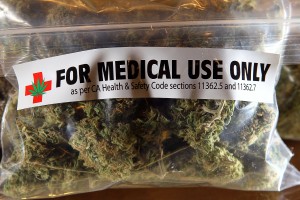The recent apology by CNN’s Sanjay Gupta as he changed his mind about medical marijuana is good, but hardly groundbreaking among the medical profession. Over 75% of physicians believe marijuana should be available for medicinal use in the United States. His story reminded me of when I changed my views about the use of marijuana for medicine.
I’d known Bo for years, she was one of those people with a constant smile, a quick laugh, and would do anything she could to help you. When my brother was dying of cancer, and I was flying to see him every weekend, she made sure I had anti-nausea medicine to give him. When I met someone new, who became my wife and had a son you couldn’t see a brighter smile of someone who was happy for you. She was just one of those people who made you feel better when she was around.
When I had my son she joked, “Save that cookie jar, because when I had my boys, they got older and I replaced the cookies with condoms.” I laughed as I filed that advice away in my brain.
Then one day she found out that her hemorrhoid was a rectal cancer, and not just superficial, but deep and involving the lymph nodes. She would need chemotherapy and radiation therapy for weeks, then surgery, and then possibly more after surgery. I knew the chemotherapy she was going to get – there are some chemotherapies that are easy – this was not one of them.
She could not get the nausea from the chemotherapy under control. She was miserable, and she had access to the most modern, costly and “effective” anti-nausea medications in the market. Then someone suggested marijuana. When I was asked about it I scoffed – saying, “oh those studies don’t show it is any more effective.”
I was wrong. The only medicine that was effective for her was marijuana. It relieved her symptoms entirely. It gave her back an appetite.
So I started asking my patients who had cancer if they had ever tried it. I was shocked – some of the most religious, elderly, starched people who had undergone chemotherapy had tried it, and found it was the only effective treatment. One was a preacher, of a church that made him sign a pledge every year that he wouldn’t drink. He winked, “they never asked about pot!”
Patient after patient, story after story. None of them were addicted to it – marijuana has less addiction potential than the drugs we doctors use, less abuse and addiction potential than alcohol, and a lot less addiction than cigarettes.
I asked them if they felt they got “high.” The most common response, “Honestly, Doc, I was so miserable, I have no idea if I got high or not. What I did get was some relief from nausea, a bit of appetite back, and that was better than any high someone could have given me.” They were not using it for recreation, they were using it to alleviate suffering.
One of the foundations of medical ethics is to relieve suffering – and that is what this drug does. Not just in my small statistical sample, or anecdotes, but in real studies over and over again. Sadly, many of those studies were done outside the US. Those published here are not of good quality.
So we have a drug (marijuana) that won’t kill a person, unlike some of the anti-nausea medications that have the potential for an overdose (every 19 seconds someone dies of an overdose of a drug ). Marijuana is a drug that is effective, ande less expensive than any of the other prescription anti-nausea medicines.
What stands in our way is the “war on drugs,” with the belief that marijuana is a “gateway” drug to other drug abuse. A notion, by the way, that has been disproven time and time again. The only way to get this drug for many is illegally, so you put money in the pockets of sociopaths who sell other drugs.
DISCLAIMER:
I have never smoked marijuana in my life. I have never tried it, or been interested in trying it. If I had cancer and required chemotherapy you can bet that I would ask for it. I am a cigar smoker- and was chagrined when on a beach in Venice, California trying to light a cigar and a police officer told me I couldn’t. When I pointed to the people smoking marijuana I was told that it might be medicine and they could not charge them. At that point I wanted a prescription for a cigar.
